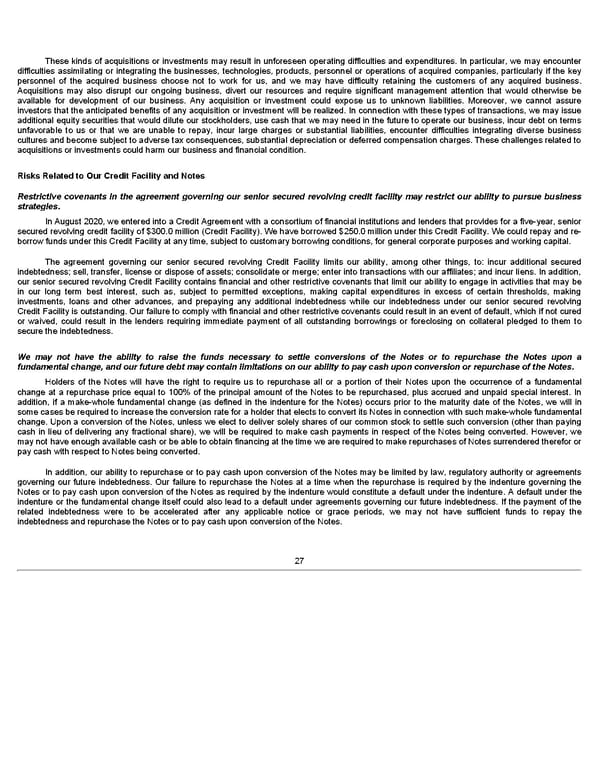These kinds of acquisitions or investments may result in unforeseen operating difficulties and expenditures. In particular, we may encounter difficulties assimilating or integrating the businesses, technologies, products, personnel or operations of acquired companies, particularly if the key personnel of the acquired business choose not to work for us, and we may have difficulty retaining the customers of any acquired business. Acquisitions may also disrupt our ongoing business, divert our resources and require significant management attention that would otherwise be available for development of our business. Any acquisition or investment could expose us to unknown liabilities. Moreover, we cannot assure investors that the anticipated benefits of any acquisition or investment will be realized. In connection with these types of transactions, we may issue additional equity securities that would dilute our stockholders, use cash that we may need in the future to operate our business, incur debt on terms unfavorable to us or that we are unable to repay, incur large charges or substantial liabilities, encounter difficulties integrating diverse business cultures and become subject to adverse tax consequences, substantial depreciation or deferred compensation charges. These challenges related to acquisitions or investments could harm our business and financial condition. Risks Related to Our Credit Facility and Notes Restrictive covenants in the agreement governing our senior secured revolving credit facility may restrict our ability to pursue business strategies. In August 2020, we entered into a Credit Agreement with a consortium of financial institutions and lenders that provides for a five-year, senior secured revolving credit facility of $300.0 million (Credit Facility). We have borrowed $250.0 million under this Credit Facility. We could repay and re- borrow funds under this Credit Facility at any time, subject to customary borrowing conditions, for general corporate purposes and working capital. The agreement governing our senior secured revolving Credit Facility limits our ability, among other things, to: incur additional secured indebtedness; sell, transfer, license or dispose of assets; consolidate or merge; enter into transactions with our affiliates; and incur liens. In addition, our senior secured revolving Credit Facility contains financial and other restrictive covenants that limit our ability to engage in activities that may be in our long term best interest, such as, subject to permitted exceptions, making capital expenditures in excess of certain thresholds, making investments, loans and other advances, and prepaying any additional indebtedness while our indebtedness under our senior secured revolving Credit Facility is outstanding. Our failure to comply with financial and other restrictive covenants could result in an event of default, which if not cured or waived, could result in the lenders requiring immediate payment of all outstanding borrowings or foreclosing on collateral pledged to them to secure the indebtedness. We may not have the ability to raise the funds necessary to settle conversions of the Notes or to repurchase the Notes upon a fundamental change, and our future debt may contain limitations on our ability to pay cash upon conversion or repurchase of the Notes. Holders of the Notes will have the right to require us to repurchase all or a portion of their Notes upon the occurrence of a fundamental change at a repurchase price equal to 100% of the principal amount of the Notes to be repurchased, plus accrued and unpaid special interest. In addition, if a make-whole fundamental change (as defined in the indenture for the Notes) occurs prior to the maturity date of the Notes, we will in some cases be required to increase the conversion rate for a holder that elects to convert its Notes in connection with such make-whole fundamental change. Upon a conversion of the Notes, unless we elect to deliver solely shares of our common stock to settle such conversion (other than paying cash in lieu of delivering any fractional share), we will be required to make cash payments in respect of the Notes being converted. However, we may not have enough available cash or be able to obtain financing at the time we are required to make repurchases of Notes surrendered therefor or pay cash with respect to Notes being converted. In addition, our ability to repurchase or to pay cash upon conversion of the Notes may be limited by law, regulatory authority or agreements governing our future indebtedness. Our failure to repurchase the Notes at a time when the repurchase is required by the indenture governing the Notes or to pay cash upon conversion of the Notes as required by the indenture would constitute a default under the indenture. A default under the indenture or the fundamental change itself could also lead to a default under agreements governing our future indebtedness. If the payment of the related indebtedness were to be accelerated after any applicable notice or grace periods, we may not have sufficient funds to repay the indebtedness and repurchase the Notes or to pay cash upon conversion of the Notes. 27
 Annua lReport Page 26 Page 28
Annua lReport Page 26 Page 28